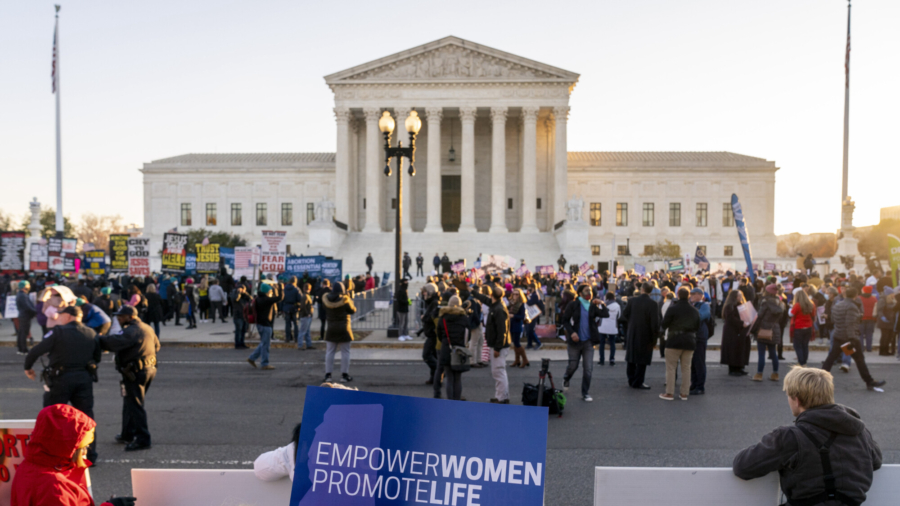Mississippi explicitly urged the Supreme Court this morning to do away with Roe v. Wade, the perpetually controversial 1973 ruling that took the regulation of abortion away from the states and made abortion lawful throughout the whole United States.
It is time for the court to finally right the wrong it made 48 years ago, Mississippi Solicitor General Scott G. Stewart told the justices during oral arguments Dec. 1.
Roe v. Wade is “an egregiously wrong decision” that allowed abortion and thereby polarized the politics of the nation for nearly half a century, Stewart said.
Besides, Stewart said, contraception is a far better alternative to abortion as a method of birth control and it is “more available and affordable” than it was at the time of Roe v. Wade and its later 1992 companion ruling of Planned Parenthood v. Casey, which held that states can’t impose significant restrictions on abortion before a fetus becomes viable for life outside the womb.
The Casey ruling didn’t specify when viability occurs but suggested it was somewhere around the 24-week gestation mark.
The current case is Dobbs v. Jackson Women’s Health Organization, court file 19-1392, a challenge to Mississippi’s Gestational Age Act, which allows abortions after 15 weeks’ gestational age only in medical emergencies or for severe fetal abnormality. Lower courts struck down the statute as unconstitutional in light of Roe v. Wade.
The hearing went well over the allotted 70 minutes, probably signaling the importance of the case.
The case is the first direct challenge to Roe v. Wade to come before the high court since conservative Justice Amy Coney Barrett’s addition to the bench a year ago nominally gave its conservative wing a 6–3 majority.
Justice Sonia Sotomayor challenged Stewart.
The legislative sponsors of the Mississippi law said they were moving forward with their bill “because we have new justices on the Supreme Court,” she said.
“Will this institution survive the stench that this creates in the public perception, that the Constitution and its reading are just political acts? I don’t see how it is possible. … If people actually believe that it’s all political, how will we survive? How will the court survive?
Representing Jackson Women’s Health Organization, the only state-licensed abortion clinic in Mississippi, was attorney Julie Rikelman of the New York-based Center for Reproductive Rights.
Rikelman told the court that it was wrong to “force women to remain pregnant” and “for a state to take control of a woman’s body.”
Getting rid of Roe v. Wade “will propel women backwards” and do “profound damage to women’s liberty,” she said.
Justice Samuel Alito said people on both sides of the abortion issue have acknowledged that drawing the line at fetal viability “doesn’t make any sense.”
“That is as [the late] Justice [Harry] Blackmun himself described it – arbitrary. If a woman wants to be free of the burdens of pregnancy, that interest does not disappear the moment the viability line is crossed. Isn’t that right?”
“Look at this on the other side,” Alito continued.
“The fetus has an interest in having a life and that doesn’t change –does it?— from the point before viability to the point after viability?”
Rikelman disagreed. “What the court says is that those philosophical differences can be resolved.”
Alito said: “That’s what I’m getting at. What is the philosophical argument, the secular philosophical argument for saying, this is the appropriate line? There are those who say that the rights of personhood should be considered to have taken hold at a point when the fetus acquires certain independent characteristics, but viability is dependent on medical technology and medical practice. It has changed; it may continue to change.”
Supporting the clinic, U.S. Solicitor General Elizabeth Prelogar, said the court “has correctly recognized that the Constitution protects a woman’s fundamental right to decide whether to end a pregnancy before viability,” and this guarantee “has engendered substantial individual and societal reliance.”
Overruling Roe and Casey would have “severe and swift” ramifications, and would be “an unprecedented contraction of individual rights and a stark departure from principles of stare decisis,” she said.
Stare decisis is Latin for standing by the decisions, or following existing legal precedents.
“The court has never revoked a right that is so fundamental to so many Americans and so central to their ability to participate fully and equally in society,” she said.
“Nearly half of the states already have or are expected to enact bans on abortion at all stages of pregnancy, many without exceptions for rape or incest,” Prelogar said.
This is a developing story. This article will be updated.
From The Epoch Times


